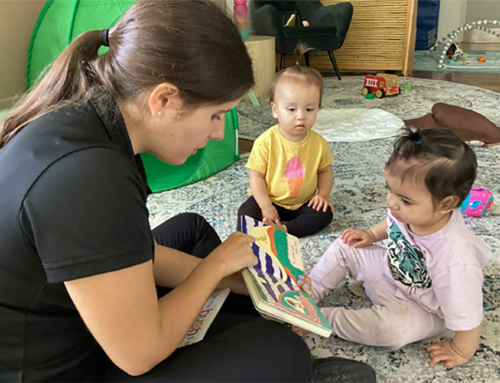It can be a big deal for dads and mums returning to work after a prolonged period of absence, which is why some employers encourage new parents to ease back into the workplace. You may also have the chance to change your working conditions to help you ease back into work.
Perhaps you haven’t set a date, or you’re not sure when to commit. Several factors may sway your decision, including finances and social necessities. When you’re almost sure it’s time, select a date and do it.
As the time for your return approaches, you’ll be filled with a bevy of emotions. That’s normal. You may also begin second-guessing your choice to return to work. We’ve included several tips to boost your confidence and prepare for change.
In this article, we’ll provide some useful tips for both mums returning to work and dads. Our parental workforce advice covers:
- Mums returning to work from maternity leave (and dads)
- Mums re-entering the workforce
- Settling children into care for the first time.

Returning to work from maternity leave
There are many excellent reasons for dads and mums returning to work after having a baby. Your maternity leave may be coming to an end, and there might be financial considerations. You may also desire more social contact or the continuation of a career.
While mums returning to work worry that their skills and abilities have atrophied, it won’t take long to regain your feet. The biggest challenge will be finding that balance between work and family. Don’t be afraid to transition slowly while you establish boundaries between work and home.
- Get organised before you go back to work. Make a list of the things you need to do and practise that first-morning run a few times before the day arrives.
- Organise daycare or other quality child care arrangements in advance. Many returning to work parents begin interviewing and booking their child’s care, months in advance because of limited availability.
- Give your employer plenty of notice that you’re coming back. Give them a call and send them an email at least a month before your return. Communicating your intentions lets them change rosters and notify maternity replacement staff.
- Practise being apart from your child before you go back to work. Organise “play dates” with the grandparents and other relatives or professional carers for an hour to start and then gradually increase this to several hours.
- See if your employer offers flexible options. For mums returning to work, but not ready for full-time hours, you might be able to start back a few days a week while you work things out. While returning to work full-time means you can jump straight back into your career, a slower start can make the adjustment between family life and work easier.

Re-entering the workforce after a prolonged absence
For many parents re-entering the workforce after a prolonged absence is a big career changer. Balancing the needs of a child and the needs of an employer can be a delicate juggling act. More so, when you’re looking for work or starting in a new role.
- When attending job interviews, ask your child care centre about casual stays. Casual visits will help your child grow more confident in their new environment. Alternatively, ask family and trusted neighbours in your community for their help.
- Stay local with your child care. Mums returning to work should shop-a-round and find an early childhood education centre close to home or work that’s right for your family.
- Communication is key. Be upfront with your employer and coworkers about expectations and your feelings in the first few weeks. Set boundaries and communicate what they can expect, so there are no misunderstandings.
- Think about how you will manage breastfeeding while working. If the child care centre is close by, you may be able to drop in for day time feeds during your breaks. Alternatively, you could express milk at work for bottle-feeding instead. Talk to your employer about what you need to make this work.
- Make a plan for dealing with illness. When children haven’t had a lot of contact with other people before they start child care, their immune system may need time to build up. Discuss with your partner and employer how you will balance work and family when your child is ill.

Tips for settling children into care
Settling into care for the first time can be a difficult time for any child at any age. Ease them into the transition slowly. Start the process before you go back to work so you can be nearby and participate for periods at a time.
- Every early childhood education centre will have its own transitioning program for new children. Talk to your Centre Director about what to expect and their preferred way to settle in a new child and if you can stay while your child begins their transition.
- Begin an open dialogue with your child’s Educators. Communicate your child’s needs, likes, and dislikes as this will assist Educators in settling your child and encouraging them to participate in the curriculum and learning programs.
- Read through your child care centre’s policies. If you’re not sure about something, your child’s Educator or Centre Director can alleviate any concerns or apprehensions.
- Help your child transition to their new surroundings. Pack your child’s comfort blanket or a favourite teddy bear to help them feel more secure.
- Call your centre to find out how your child is settling in. This can help relieve any anxiety you may feel.
- Prepare your child’s child care bag and clothes the night before they go. You may need to add a few things the next day (like their lunch), but you’ll be less stressed, calmer and collected when you’re on top of things and organised.
Dads and mums returning to work feel a whole range of mixed emotions. You might feel excited about working and being around adults again but at the same time feeling anxious and guilty about leaving your child. Transitions can be a little topsy-turvy. Eventually, things will settle down, and your child’s identity, independence and sense of belonging will grow.

Return to work with Petit Early Learning Journey
At Petit ELJ, we understand that it can be a significant change for dads and mums returning to work. We encourage and promote partnering with families as it develops strong reciprocal relationships that benefit the children.
We believe it is essential for our teams to work closely with their families. We listen, understand and partner with you on things that matter most. We empower families as decision-makers so that we can give your child the best care and early learning education.
To find out how we help mums returning to work (and dads) and provide support for children transitioning to child care, talk to your nearest Centre Director.






